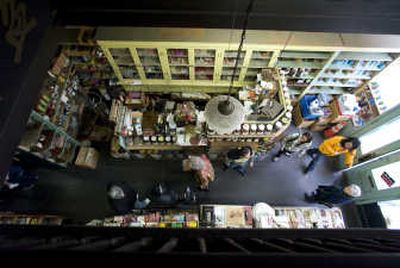Seattle Chinatown store to live on in museum

SEATTLE – Jimmy Mar, a 93-year-old with a keen memory, opened the green wooden door to the Yick Fung Co. in Seattle’s Chinatown for one of the last times Sunday.
His relatives walked past the store’s English and Chinese name that appears in chipped-yellow paint on the front windows.
Inside, they hugged one another, looked at the store’s vintage items one last time as a family and stood under a large wooden sign in Chinese that means “togetherness.”
At the end of this week, the Yick Fung Co., one of Chinatown’s longest-operating stores that served customers for nearly a century, will close its doors at 705 S. King St.
“It’s like losing a son,” said Mar, who has worked there 67 years. “I’ll miss this, coming down here every morning, helping people. I think that’s what kept me alive.”
The Mar family, which opened the import-export store in 1910, is donating the ceramic bowls, handwritten account books, woks, aging scales and other historic gems to the Wing Luke Asian Museum.
The museum reopens May 31 next door at its new expanded location. Starting Monday, its staff will move goods from the three-level store that is reminiscent of life in a southern Chinese town to the museum.
Cassie Chinn, museum deputy program director, said much of the store, including its wooden shelves filled with glass jars of Chinese preserved vegetables and faded cans of bamboo shoots, will be rebuilt inside the museum.
Haydon Mar, Jimmy Mar’s son, said the museum’s reopening comes at the right time for his father and family to make a change.
“I’m happy he’s willing to let it go, as compared to being forced to close,” the 46-year-old son said. “He’s spent all his time here.”
About 40 family members and friends gathered Sunday for the private farewell.
“Our purpose during the good old days was to supply food and goods to restaurants,” Jimmy Mar said.
In 1898, his father, Mar Fook Hing, arrived in Port Townsend from China. He moved to Seattle in 1909 after hearing that a Chinatown was growing, and he opened the business a year later.
It was either in the humid fields of Toisan, his home in southern China, or in Seattle that he learned a key lesson, Jimmy Mar said.
“It was to help everybody regardless if they’re rich or poor and to treat everyone like family,” he said.
The store grew to become a bustling community hub, where residents found hard-to-find items from Asia and swapped gossip.
Restaurant cooks, who were particular, wanted to see food on display, which explains the store’s layout with jars, bags and cans.
Imported food was shipped to restaurants in Washington, Montana, Idaho and Oregon.
Jimmy Mar’s uncles ran the China Cab Co., a cargo service and a barbershop – all to help make life easier for Chinatown members.
The store also became the agent for the Blue Funnel Line, a steamship company that brought Chinese to Seattle before World War II.
Chinese sojourners, mainly men in their 60s who wanted to die in their birthplace, would stay in rooms above the Yick Fung Co. before boarding a ship for home.
Each Sunday, a cook roasted two 50-pound pigs in the store’s wood-burning brick oven. The meat would hang in the store’s window, similar to what can be found in Chinatown today.
In 1938, Mar’s father died. While Jimmy Mar served in the Army during World War II, a relative helped run the business.
Upon Jimmy Mar’s return to Seattle, he worked at the store and rebuilt the business. Since then, it has changed little.
As the family posed Sunday for a group photo, Marie Wong, a Seattle University associate professor, explored the mezzanine level, which has a shelf of large, restaurant-size woks.
“I wish this could stay like this,” said Wong, who is researching the International District’s history. “This space is the last vestige of historic Chinatown. It’s been altered the least.”